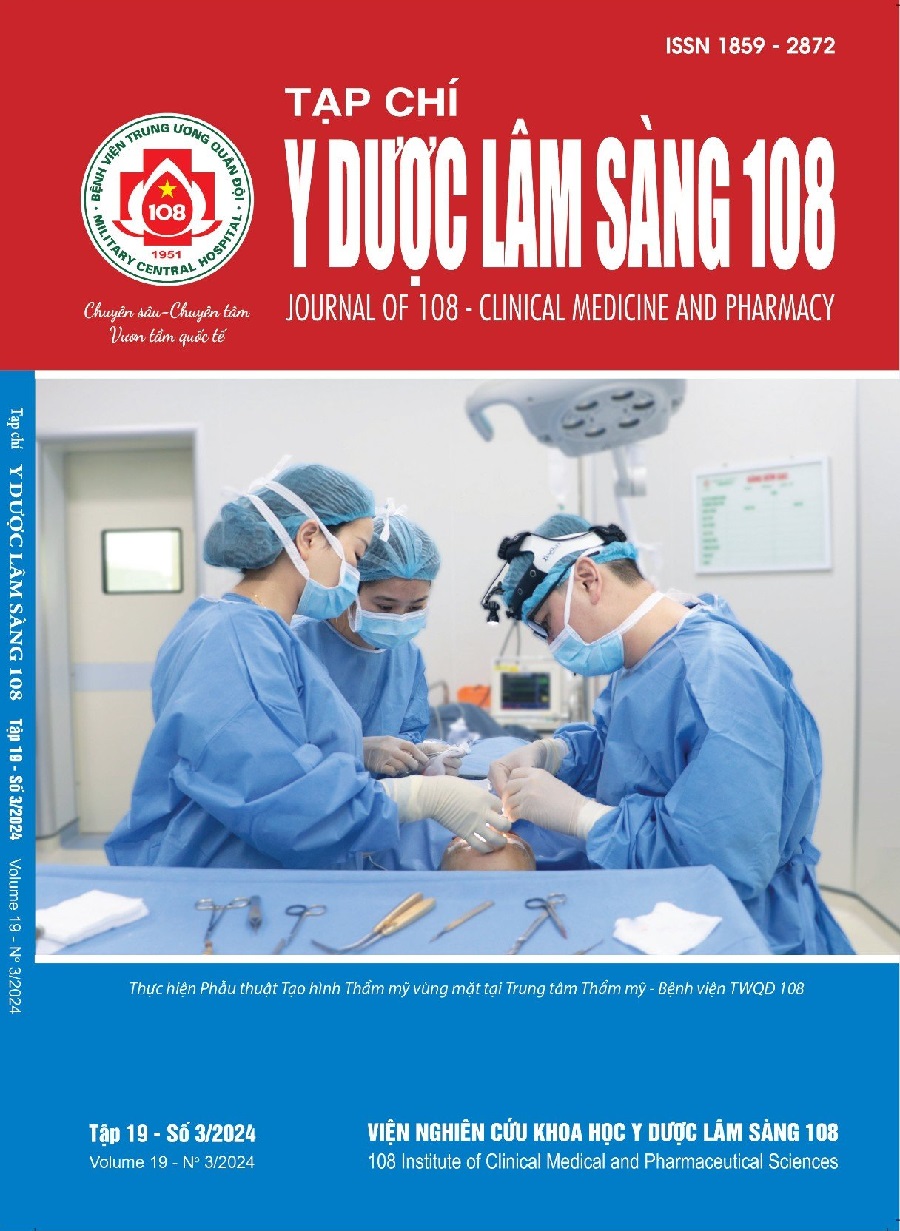Evaluate the safety and effectiveness of aortic valve replacement through the right anterior thoracotomy at the second intercostal space
Main Article Content
Keywords
Abstract
Objective: To evaluate the safety and effectiveness of aortic valve replacement through the 2nd intercostal space right anterior thoracotomy, especially for elderly patients. Subject and method: Study on 74 patients undergoing aortic valve replacement surgery through the 2nd intercostal space right anterior thoracotomy at Hanoi Heart Hospital and 108 Military Central Hospital, from October 2019 to December 2022. Patients were evaluated preoperatively and postoperative follow-up for at least 6 months. Result: Early death rate was 1.4%, bleeding required reoperation 2.7%; postoperative pneumonia, acute kidney failure, cerebral stroke, peripheral occlusion, and permanent pacemaker were 13.5%, 18.9%, 4.2%, 2.8%, 1.4% respectively. Some risk factors before, perioperative and after surgery had no statistically significant impact on postoperative complications. The time of mechanical ventilation, intensive care stay, hospital stay and early postoperative complications did not differ between the group over 65 years old and the group under 65 years old. Conclusion: Aortic valve replacement through the 2nd intercostal space right anterior thoracotomy is a safe treatment method with low mortality and major adverse events. This technique can be effectively applied to elderly patients.
Article Details
References
2. Chang C, Raza S, Altarabsheh SE et al (2018) Minimally invasive approaches to surgical aortic valve replacement: A meta-analysis. The Annals of thoracic surgery 106(6): 1881-1889. doi:10.1016/j.athoracsur.2018.07.018.
3. Fattouch K, Moscarelli M, Del Giglio M et al (2016) Non-sutureless minimally invasive aortic valve replacement: Mini-sternotomy versus mini-thoracotomy: a series of 1130 patients. Interactive cardiovascular and thoracic surgery 23(2): 253-258. doi:10.1093/icvts/ivw104.
4. Thái PT (2021) Đánh giá kết quả phẫu thuật thay van động mạch chủ ít xâm lấn qua đường mở ngực trước bên phải. Đại học Y dược thành phố Hồ Chí Minh.
5. Lamelas J, Mawad M, Williams R, Weiss UK, Zhang Q, LaPietra A (2018) Isolated and concomitant minimally invasive minithoracotomy aortic valve surgery. The Journal of thoracic and cardiovascular surgery. 155(3): 926-936.. doi:10.1016/j.jtcvs.2017.09.044.
6. Olds A, Saadat S, Azzolini A et al (2019) Improved operative and recovery times with mini-thoracotomy aortic valve replacement. J Cardiothorac Surg. 14(1):91. doi:10.1186/s13019-019-0912-0
7. Stolinski J, Plicner D, Grudzien G et al (2016) Computed tomography helps to plan minimally invasive aortic valve replacement operations. The Annals of thoracic surgery 101(5): 1745-1752. doi:10.1016/j.athoracsur.2015.10.076.
8. Glauber M, Gilmanov D, Farneti PA et al (2015) Right anterior minithoracotomy for aortic valve replacement: 10-year experience of a single center. The Journal of thoracic and cardiovascular surgery 150(3): 548-556.. doi:10.1016/j.jtcvs.2015.06.045.
9. Stolinski J, Plicner D, Grudzien G et al (2016) A comparison of minimally invasive and standard aortic valve replacement. The Journal of thoracic and cardiovascular surgery 152(4): 1030-1039. doi:10.1016/j.jtcvs.2016.06.012.
10. Grossi EA, Loulmet DF, Schwartz CF et al (2011) Minimally invasive valve surgery with antegrade perfusion strategy is not associated with increased neurologic complications. The Annals of thoracic surgery 92(4): 1346-1349; discussion 1349-1350. doi:10.1016/j.athoracsur.2011.04.055.
11. Agarwal S, Garg A, Parashar A et al (2015) In-hospital mortality and stroke after surgical aortic valve replacement: A nationwide perspective. The Journal of thoracic and cardiovascular surgery. 150(3): 571-578.. doi: https://doi.org/ 10.1016/j.jtcvs.2015.05.068.
12. Lamelas J (2015) Minimally invasive aortic valve replacement: the "Miami Method". Ann Cardiothorac Surg 4(1): 71-77. doi:10.3978/j.issn.2225-319X.2014.12.10.
13. Solinas M, Bianchi G, Chiaramonti F et al (2020) Right anterior mini-thoracotomy and sutureless valves: The perfect marriage. Ann Cardiothorac Surg 9(4): 305-313.
14. Fudulu D, Lewis H, Benedetto U, Caputo M, Angelini G, Vohra HA (2017) Minimally invasive aortic valve replacement in high risk patient groups. Journal of thoracic disease 9(6): 1672-1696. doi:10.21037/jtd.2017.05.21.
15. Cammertoni F, Bruno P, Rosenhek R et al (2020) Minimally invasive aortic valve surgery in octogenarians: Reliable option or fallback solution? Innovations 16(1): 34-42. doi:10.1177/15569 84520974467.
 ISSN: 1859 - 2872
ISSN: 1859 - 2872
